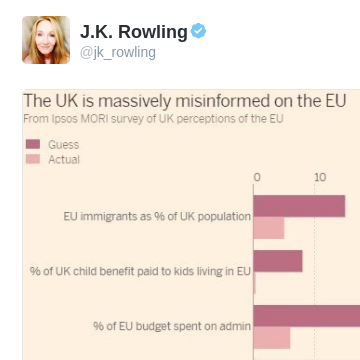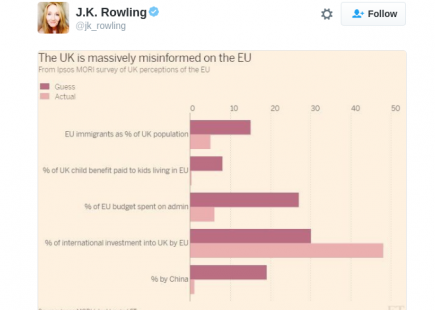Ideas into movement
Boost TNI's work
50 years. Hundreds of social struggles. Countless ideas turned into movement.
Support us as we celebrate our 50th anniversary in 2024.

Check your history and think again, argue Hilary Wainwright and Mary Kaldor

J.K. Rowling

J.K. Rowling
Yes, governments committed to free market policies and austerity dominate the EU at present. Transnational corporations have lobbied successfully, with massive resources, to influence EU policy in their favour. But it was not always this way. And there have been many successful attempts to challenge these policies and to overturn corporate power and its influence on the EU. Indeed, time and again, we have won reforms by organising across borders.
Underlying these possibilities to struggle for change is a tension in the very foundations of the EU between different visions of Europe. Many of the founders of the European Union came out of the resistance to fascism during World War II; their aim was to prevent war, fascism and imperialism. Their cosmopolitan vision can be traced back to European political philosophers like Immanuel Kant, Jean-Jacques Rousseau, or Jeremy Bentham who all developed perpetual peace schemes that anticipated something like the European Union. This cosmopolitan vision was taken forward by those who resisted authoritarian and military regimes in Portugal, Spain, and Greece, by those who wanted to end the Cold war in pan-European peace and human rights groups, by the European Social Forum, and among new movements in countries bordering the European Union to the East and South.
There was, however, a very different vision of Europe promoted by European political and economic elites. From the late nineteenth century onwards, many members of the European elite feared the growth of big powers like the United States, Russia or China and how this might dwarf the European nation-state. Winston Churchill wanted European states, for example, to pool their colonies, while European business favoured a larger regional market.
These competing visions have played out differently through the history of the European Union. It can be argued that in the early years of the European Union, the cosmopolitan vision was more dominant. The so-called Monnet method, after one of the founders and former resistance hero, Jean Monnet, focussed on economic and social integration as a way of bringing people together. Up until 1991 (the Maastricht Treaty) the EU promoted integrated investments in infrastructure (coal and steel) energy, agricultural policies and regional assistance (for poorer regions)
In 1989 the EU, under the leadership of Commission President and ex trade union official, Jacque Delors, drew up a charter for employees, by which employees have the right to a fair wage and to equal treatment for men and women, a safe work environment, training, freedom of association and collective bargaining, provision for disabled workers, freedom of movement from country to country, guaranteed standards of living both for the working population and for retired people known as the Social Charter.
Margaret Thatcher called this ‘socialism by the back door’ and did her best, with other right wing governments to ensure that the charter became powerless.
The free marketeers, however, determined to reduce the cost – and therefore the rights -of labour could not entirely get their way. Labour movements in different countries put pressure on their governments to stick by the charter and these movements also organised across Europe to put pressure directly on the European Commission and the European Parliament. As a result key rights – limits on weekly hours, guaranteed breaks at work, paternity leave, rights for agency workers and minimum amounts of annual holiday still remain.
Several other attempts to serve the interests of big private employers also got blocked through campaigning and democratic action by labour and social movements working with MEPs and also progressive members of the commission. These include:
There are still aspects of the European Union that express the cosmopolitan vision of Europe. In its external policy, EU policy is based on peace and human rights rather than geo-political interest and military defence of borders, as is the case for NATO and individual nation-states. Since the establishment of the Common Security and Defence Policy (CSDP), there have been over 30 missions both civilian and military, under UN mandates, aimed at preventing atrocities, public security especially during elections, establishing a rule of law, anti-piracy and humanitarian missions.
The EU is the biggest aid donor in the world. EU cyber security policy is aimed at protecting civil liberties in contrast to all state cyber security policies which are only aimed at state security. These policies are not very visible and have many shortcomings but they are very different form the war-like approach of big powers.
The threats to democracy today are corporate power, xenophobic nationalism and the security state.
Corporations and banks have way too much influence in the EU but they have even more influence over the British government. The same is true is true of the security state. And with Brexit, they will have free range. That’s why so many corporate bosses favour Brexit because it will end all social regulation and enable them to treat workers as they like.
At least with the EU there are transnational institutions that have the potential – if we fight for this potential to be realised, to exert social controls over these predatory monsters, and to expose and challenge the workings of the security state, something that is beyond the power of national governments acting on their own.
Surely then, the EU IS reformable. It is a site of democratic contestation, but the forces of democracy need to be massively strengthened. Vote ‘in’ and you can become part of a transnational movement for democracy.